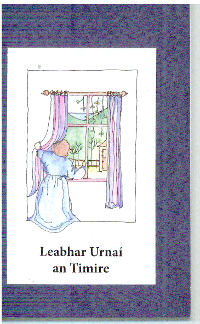Leabhar Urnaí an Timire
níl aon eagarthóir ainmnithe (Foilseacháin Ábhar Spioradálta, €5)
Tadhg Ó Dúshláine
This slim volume of less than 50 pages will come as a godsend to the increasing number of teachers in Gaelscoileanna, under the trusteeship of the Church, charged with the transmission of the faith in a broken culture, where the rich heritage of prayer can no longer be taken as a given.
The formidable Caiticiosma na hEaglaise Caitlicí is not easily accessible; the Irish version of Ucat is neither available, nor planned; and the old reliable Gairdín an Anama is both out of date and out of print.
Pope Francis frequently draws our attention to the decrees of the Second Vatican Council, stressing the importance of acculturation.
The Irish experience of Christianity since the beginning has been just that: one of accommodation and amalgamation of the native and Roman traditions, making the Irish language the oldest vernacular in Europe. In the 17th Century the Irish Franciscan school in Leuven did much to maintain the continuum, producing a veritable library of devotional and catechetical material for the home mission.
This attractive little booklet is very much in that tradition: modern, innovative, inclusive and evocative in design.
The front and back cover illustrations are indicative of our time, and yet, Ceallachán’s morning prayer of the 8th Century echoes through the pastel opulence of the front cover, while ‘Pangur Bán’ and ‘An t-éan beag …’, lurk somewhere near the back cover; and a vessel resembling a Galway Hooker accompanied by Fungi, the Dingle dolphin, illustrate the traditional offertory hymn, ‘Ag Críost an Síol’.
The content is divided into seven separate sections, from the basic ‘Paidreacha Coitianta’ to the Adoration of the Eucharist. Coincidentally, or otherwise, this layout resembles that of a booklet similar in size and format published 60 years ago. But there the comparison ends.
The earlier work is very much pre-Vatican II, with no acknowledgement, recognition or inclusion of the native tradition.
In contrast, the core sections of this collection, ‘Urnaí i Rith an Lae’ and ‘Paidreacha don Tríonóid Naofa’ breathe the vitality and authenticity of that ongoing tradition.
How natural and inspirational, for instance, is the ‘Grace before meals’ of this collection, compared with the uninspiring translation from the Latin in the pre-Vatican II booklet.
Worthwhile things take time, the proverb cautions, and while more than half a century has passed since such a natural collection as this might have been expected, it is never too late, and please God, it will find its voice in many of the Gaelscoil and further afield.



